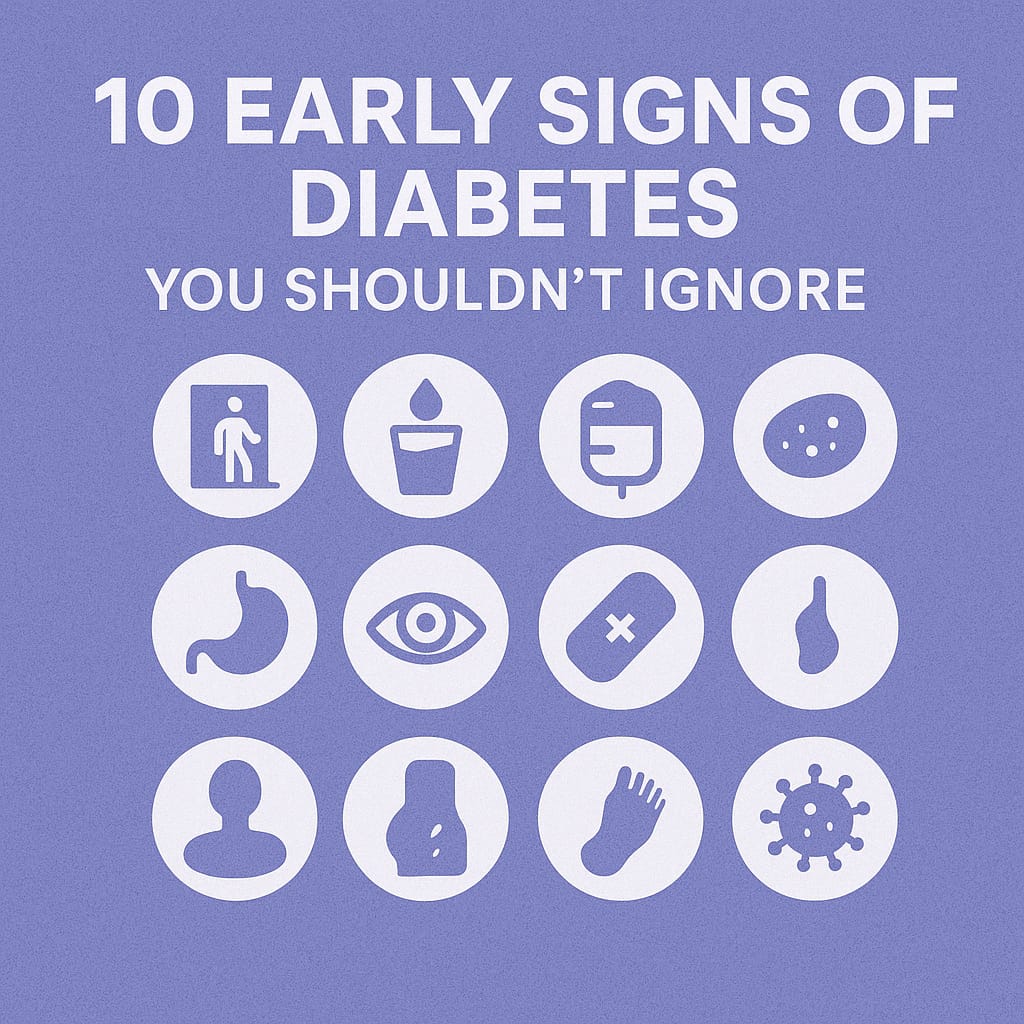Written by Dr. Raghvendra Kumar Singh | Octavia Hospital 📖 Introduction: Why Recognizing Early Signs of Diabetes Matters Diabetes is one of the most prevalent chronic conditions worldwide, and its early detection is key to …

10 Early Signs of Diabetes You Shouldn’t Ignore
Written by Dr. Raghvendra Kumar Singh | Octavia Hospital
📖 Introduction: Why Recognizing Early Signs of Diabetes Matters
Diabetes is one of the most prevalent chronic conditions worldwide, and its early detection is key to managing the disease effectively. Left untreated, diabetes can lead to serious complications like heart disease, nerve damage, and kidney failure. That’s why being aware of the early warning signs is crucial — especially since Type 2 diabetes often develops without noticeable symptoms.
At Octavia Hospital, we believe in empowering patients with knowledge about diabetes prevention and early detection. Consultant Physician Dr. Raghvendra Kumar Singh is dedicated to helping patients recognize the signs of diabetes and take proactive steps toward managing their health.
In this blog, we’ll explore 10 early signs of diabetes that should never be ignored. By spotting these symptoms early, you can seek timely medical intervention and significantly improve long-term health outcomes.
🔍 10 Early Signs of Diabetes You Shouldn’t Ignore
1️⃣ Frequent Urination (Polyuria)
Significance:
One of the earliest signs of diabetes is frequent urination, especially at night. When blood sugar levels are too high, the kidneys work overtime to filter the excess glucose. This leads to increased urine production, which may leave you feeling the need to urinate more often.
Why It Happens:
Excess glucose in the blood forces the kidneys to filter out more water, causing frequent trips to the bathroom.
2️⃣ Increased Thirst (Polydipsia)
Significance:
If you’re suddenly feeling thirsty all the time, it may be an early sign of diabetes. Frequent urination due to high blood sugar levels causes the body to lose more water, leading to dehydration and increased thirst.
Why It Happens:
As your body loses more fluids, it triggers the brain to signal that you need to drink more water to compensate.
3️⃣ Unexplained Weight Loss
Significance:
Weight loss despite eating normally or even more than usual can be an alarming symptom. In diabetes, the body cannot effectively use glucose for energy. As a result, the body starts breaking down fat and muscle to fuel itself.
Why It Happens:
When insulin is not functioning properly, glucose can’t enter cells, leading to weight loss and muscle breakdown.
4️⃣ Increased Hunger (Polyphagia)
Significance:
If you’re always hungry, even after eating, it could be a sign of diabetes. This occurs when the body’s cells are unable to get enough glucose, making the body crave more food to get energy.
Why It Happens:
The body starts signalling that it needs more food because cells are deprived of glucose, even if the person is eating.
5️⃣ Fatigue and Weakness
Significance:
Persistent tiredness or weakness, even after a full night’s rest, is a common symptom of diabetes. When cells don’t get enough glucose to function properly, it can lead to feelings of fatigue and low energy.
Why It Happens:
Without the energy provided by glucose, the body’s cells lack fuel, leading to sluggishness and weakness.
6️⃣ Blurred Vision
Significance:
High blood sugar can cause the lens of the eye to swell, affecting your ability to focus and leading to blurry vision. This symptom can come on gradually, and it’s often overlooked.
Why It Happens:
Excess glucose in the blood can lead to swelling in the lens of the eye, affecting vision and causing discomfort.
7️⃣ Slow-Healing Sores or Cuts
Significance:
Diabetes can impair the body’s ability to heal wounds, leading to cuts and sores that take longer to heal. High blood sugar can affect circulation, making it harder for the body to deliver nutrients to the injured area.
Why It Happens:
Poor circulation and nerve damage (a common consequence of diabetes) can slow down the body’s healing process, leaving wounds vulnerable to infection.
8️⃣ Numbness or Tingling in Hands or Feet (Neuropathy)
Significance:
Nerve damage, or diabetic neuropathy, can occur over time in people with poorly controlled diabetes. Early symptoms include tingling or numbness, especially in the hands and feet.
Why It Happens:
High blood sugar levels can damage nerves, particularly in the extremities, leading to discomfort and loss of sensation.
9️⃣ Darkened Skin Areas (Acanthosis Nigricans)
Significance:
Some people with diabetes may notice patches of dark, velvety skin in areas such as the neck, armpits, or groin. This condition, known as acanthosis nigricans, can be an early sign of insulin resistance.
Why It Happens:
Insulin resistance causes increased insulin levels in the blood, which can affect skin pigmentation.
🔟 Recurrent Infections
Significance:
People with diabetes are more prone to infections, particularly urinary tract infections (UTIs), skin infections, and yeast infections. This is due to elevated blood glucose levels that provide a favorable environment for bacteria and fungi.
Why It Happens:
High blood sugar weakens the immune system, making it harder for the body to fight off infections.
📌 Final Thoughts from Dr. Raghvendra Kumar Singh
Recognizing these early signs of diabetes is critical for taking charge of your health and preventing complications. If you experience any of these symptoms, it’s essential to consult a healthcare provider for diabetes screening and diagnosis. Early detection can make a huge difference in managing the condition and reducing the risk of long-term complications.
At Octavia Hospital, we provide comprehensive diabetes care, including screening, personalized treatment plans, and lifestyle management advice. With expert care and timely intervention, diabetes is a manageable condition.
Book your consultation today at Octavia Hospital, where we combine expertise with compassionate care to ensure the best possible outcomes for our patients.






